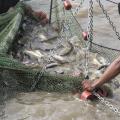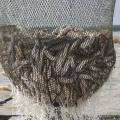News Filed Under Catfish
STARKVILLE, Miss. -- Growers in south Mississippi recently shared their research and programming needs with Mississippi State University’s agricultural specialists, and producers in the state’s central and northern areas will soon have their turn.
The MSU Extension Service and Mississippi Agricultural and Forestry Experiment Station will host Producer Advisory Council meetings at three of their research and Extension centers across the state.
Coastal wetland conservation and restoration projects along the Mississippi Gulf Coast and beyond are running into a distinct challenge: there often aren’t enough locally sourced native plants readily available to complete these efforts.
The Mississippi State University Extension Service is meeting this problem head-on by enlisting plant enthusiasts to grow and sell these marsh plants. The effort is organized as the Native Plant Producer Network, or NPPN, and it was started in 2023.
STARKVILLE, Miss. -- Lower feed prices are providing some relief to Mississippi’s catfish producers, but many are still facing more than their share of obstacles just to break even.
Among these are middling demand, high operating costs and renovation.
While every job has stress points, few people go to work knowing they could lose hundreds of thousands of dollars in any given day. That is a reality for many in the agricultural sector, and mental health struggles are a frequent result.
STARKVILLE, Miss. -- As long as feeding catfish stays pricey, anticipate paying more for fillets at the grocery.
“High grain prices in recent years have pushed catfish feed prices to $495 to $525 per ton, depending on protein level,” said Jimmy Avery, Mississippi State University Extension Service aquaculture professor at the Delta Research and Extension Center in Stoneville. Five-year averages for 32% protein feed hovered in the $375-to-$420-per-ton range between 2017 and 2021.
STONEVILLE, Miss. -- A Mississippi State University Extension professor has received the U.S. Aquaculture Society’s Distinguished Lifetime Achievement Award for his contributions to the aquaculture industry.
Jimmy Avery, an Extension professor in the National Warmwater Aquaculture Center at the Delta Research and Extension Center and director of the U.S. Department of Agriculture National Institute of Food and Agriculture Southern Regional Aquaculture Center, received the Lifetime Achievement Award for 2023.
VERONA, Miss. -- Producers come across issues each season that need to be addressed, whether they require new research on a problem or a commodity specialist who can help identify timely solutions.
For those people, February is the month to speak up. Specialists and scientists with the Mississippi State University Extension Service and Mississippi Agricultural and Forestry Experiment Station are available specifically for them at three different MSU Research and Extension Center locations throughout the state during annual Producer Advisory Council meetings.
STARKVILLE, Miss. -- Though monkeypox is not as easily spread as COVID-19, it has become a public health concern as documented case counts approach 4,000 nationwide.
The monkeypox virus is part of the same family of viruses as smallpox. Monkeypox symptoms are similar to smallpox symptoms but milder. Infections in this outbreak are from the West African type, which has an infection fatality rate of 1% and is considered the milder of the two types of the virus.
Catfish producers in Mississippi are receiving good prices for their products, but their continued profitability faces challenges from high heat and high costs for feed and fuel. Mississippi has 34,100 acres of catfish ponds found mostly in the Delta, with some scattered in Noxubee, Lowndes and Chickasaw counties in east Mississippi.







